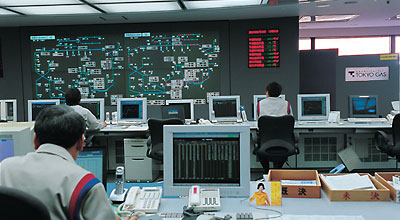Natural gas flows through a complex network of pipes under major cities. An earthquake can break some of these pipes, releasing gas that might cause a major fire or explosion. To reduce this risk, Tokyo Gas Co., Ltd., introduced its SUPRIME system in 2001.
Working under centralized control, SUPRIME ensures integrated monitoring of gas pressure on residential lines, and can operate local shut offs at 3,800 locations to reduce that pressure. If the system determines that an earthquake has caused a major gas leak, all local shut offs controlling gas supply in affected areas halt the flow of gas. The signal to shut down is sent over telephone lines.
Before, local shut offs automatically stopped gas flow whenever a jolt was more than a predetermined intensity. But there were cases where just one shut off would not kick in because ground movement happened to be insignificant there. As a result, gas would continue to flow in that area. Having staff close valves manually after an earthquake would take too long, and this is why the company installed SUPRIME. Now, supplies can be halted to all areas in a relatively short time, from 40 minutes to one hour after the system detects an earthquake-induced gas leak.

